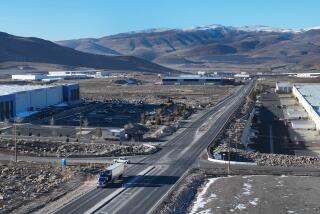Rejuvenated Resort Spurs Economy of Impoverished Area of Spain : Skiing: Improved facility lures three times as many visitors and becomes the biggest winter employer in Granada.
- Share via
SIERRA NEVADA, Spain — When banks wanted to foreclose on Sierra Nevada a decade ago, it was a rundown ski resort--but a potential resource in this impoverished part of southern Spain.
Gian Franco Kasper, perhaps the most powerful player in the skiing business, has bleak memories of his first visit to Europe’s southernmost winter resort.
“It was a very small little sleeping village with a chairlift and nothing else. It looked very ugly,” said Kasper, a Swiss who heads skiing’s world governing body, FIS. Kasper said the resort needed a “white knight.”
That champion turned out to be Jeronimo Paez, a bookish 51-year-old tax lawyer and former national ski champion who coaxed the regional government and the city of Granada into buying the resort in 1984, pitching it as a cost-effective source of jobs in an area where one person in three is out of work.
The decrepit resort--modernized with about $150 million in public funds in the past five years--has become the largest winter employer in Granada province, generating about 3,500 jobs in the peak season, up from about 500 a decade ago.
It also attracts three times more skiers than it did 10 years ago to the highest mountain range in continental Spain, where locals say you can see across the Mediterranean to north Africa on a clear day.
*
Sierra Nevada is equipped with Europe’s most sophisticated snow-making and weather-monitoring technology. From a control room lined with television monitors and large, three-dimensional maps of the mountains, technicians monitor 38 miles of slopes and control 130 snow cannons.
However, even that technology couldn’t save last month’s World Alpine Skiing Championships, which had to be postponed for the first time because of a snow drought. The resort will hold the event next February.
“Of course we were disappointed, but getting the championships here was really just a pretext to develop the resort and get some badly needed jobs,” said Paez, who headed the championships and is the director of the government-run company that manages the resort.
The postponement has brought Paez criticism from people who say the resort overspent to lure the championships--a charge he dismisses. Paez also has been attacked by environmentalists critical of the resort’s development and encroachment on national park land.
Paez responds that Sierra Nevada has been a better investment than the billions of dollars in public money spent on the Seville World’s Fair and the Barcelona Olympics in 1992.
“What we’ve spent in Sierra Nevada and Granada to create thousands of lasting jobs is about what they spent in Seville to build a few bridges--or on the opening and closing ceremonies in the Olympic Games,” Paez said.
Imaculada Vilardebo, a former journalist who works with Paez, described him as a businessman but in a public context, and as one “who loves his homeland of southern Spain and has come up with creative ideas and projects to get it out of its historic poverty.”
Paez also spearheaded a drive to start the Paris-Dakar auto race this year in Granada instead of Paris, a change that will continue next year.
About $500 million in public money has been spent in the last five years in the resort and Granada. Of this, about $150 million was spent in the ski resort for snow machines, new lifts and accommodations. Two new hotels have just opened, modeled after similar accommodations in the Canadian resort of Whistler, British Columbia.
The rest of the money has gone to the city of Granada, largely to modernize an old airport, for new stretches of road and tunnels linking the city to the ski resort 25 miles away, and for other infrastructure improvements.
Paez said an additional $700 million was being spent on major highway projects linking Granada with Madrid and cities along the nearby Mediterranean coast--funds that would have eventually been spent but were speeded by the investment in Sierra Nevada.
More to Read
Sign up for Essential California
The most important California stories and recommendations in your inbox every morning.
You may occasionally receive promotional content from the Los Angeles Times.










